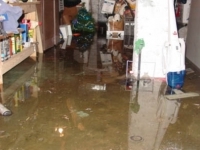Close But No Cigar and other interesting sayings - an etymology thread
My son who was a radio DJ and musician likes vinyl records and so do many other musicians. They say it has a softer less metallic sound than some newer technologies. There is a small move by some musicians to make vinyl records with only a few songs.
When I was a young child, we had a similar situation (Gresham’s Laundry, in St Kilda, Vic, Australia). Around age 7 or 8, I was allowed to help her write the lists - a rite of passage to teach her children the housekeeping arts. 
galileo said:
Growing up in Maplewood believe it or not we had no washing machine . Every week the Imperial Laundry truck would stop to collect the laundry(not small items). This included sheets,towels tablecloths, napkins and my father's white shirts. My mother always made a laundry list to make sure she received everything back.
Who else still uses any version of ‘calling the kettle black’ - in any language? We used it in English, and still do among ourselves, to mean ‘look at yourself, first’ but recognise not everyone might recognise it has nothing to do with race.
I grew up with the Polish Yiddish version too, which I can’t spell, and which roughly means ‘don’t speak rubbish’ (stop bashing your kettle).
joanne said:
Who else still uses any version of ‘calling the kettle black’ - in any language? We used it in English, and still do among ourselves, to mean ‘look at yourself, first’ but recognise not everyone might recognise it has nothing to do with race.
I grew up with the Polish Yiddish version too, which I can’t spell, and which roughly means ‘don’t speak rubbish’ (stop bashing your kettle).
Formerlyjerseyjack said:
Pop Goes The Weasel
refers to spinning wheels. a part of the spinning wheel was called the weasel
My cockney grandad said that the "weasel" was a coat (weasel and stoat), which you pawned when you were desperate. It's a London song, so that seems plausible to me.
I’ve found a reference that credits both possibilities: I remember being taught the pub/pawn version in first year Uni, English.
jonesey said:
My cockney grandad said that the "weasel" was a coat (weasel and stoat), which you pawned when you were desperate. It's a London song, so that seems plausible to me.
https://www.historic-uk.com/CultureUK/More-Nursery-Rhymes/
Half a pound of tuppenny rice,
Half a pound of treacle,
That’s the way the money goes,
Pop goes the weasel.
This very popular music hall song could be heard being performed throughout Victorian London’s many theatres. The origins to the lyrics however, appear to stem from two possible sources.
One theory has its origins in the same grimy streets as those Victorian music halls, from the packed sweatshops of Shoreditch and Spitalfields that provided Londoners with their clothing. In the textile industry, a spinner’s weasel is device that is used for measuring out a length of yarn; the mechanism makes a popping sound when the correct length has been reached. No doubt during this highly repetitive and boring work, the spinner’s mind would wander to the more mundane, only to be brought back to harsh reality when the weasel went pop.
The third verse of the same rhyme perhaps suggests an alternative origin, which is based upon the Londoners use of cockney rhyming slang;
Up and down the city road,
In and out the Eagle,
That’s the way the money goes,
Pop goes the weasel.
To “pop” is a London slang word for pawn. Weasel can be traced to the cockney rhyming slang of “weasel and stoat”, or coat. Even a very poor Victorian Londoner would have had a Sunday best coat or suit that could be pawned when times got hard (Pop goes the weasel), perhaps on cold and damp Monday morning, only to be retrieved on pay day. The Eagle above refers to the Eagle Tavern, a pub located on the corner of City Road and Shepherdness Walk, in the north London district of Hackney. Although the usage of the building has changed over the years, the current Eagle pub dating from the early 1900’s, proudly sports a plaque outlining its association with the nursery rhyme.
Just wondering (it popped up in conversation today and I thought of this thread), do you use ‘bush week’ at all or that uniquely ours?
When I was very young, it was uttered in shocked tones ‘what do you think this is, bush week??’, to which a smart alec might reply ‘no, Forest Fortnight!!’ And then quickly duck the slapping hand/thrown object. Usually the admonition was to correct behaviour, or smarten your appearance/attention to details etc, however sometimes it was said to gain the speaker some peace and quiet.
I’ve found this definition:
bush week = Uncultured behaviour, referring to the possibility of people living in the bush (without refined manners) coming down to the city en masse and acting up, e.g. “Don’t lick your fingers. What do you think this is? Bush week?”
There’s also a reference to a land development program in Sydney a century ago, with the theme of ‘Bush Week’.
"Bush" as meaning rural isn't too common here -- that's one of those phrases that, to me at least, feels almost stereotypically Australian. Two exceptions to that come to mind though. First, "bush pilots" -- people who fly small planes in remote areas. That's almost exclusively something in an Alaskan or Canadian context though; I don't think I've ever heard of a "bush pilot" in the lower 48 and, if you didn't go through a mild Alaskan/Northern Canada obsession growing up as I did, you might not even be familiar with the phrase.
The second is actually pretty close to your usage I think -- "bush league" -- meaning amateur or second rate.
H’m, in that case I wonder if Canadians or other Commonwealth nations (those in Africa, for example) might use the phrase? I vaguely remember hearing it in an old SA film.

joan_crystal said:
My favorite pet peeve when it comes to idioms is "Have a good day if I don't see you." Will you will have a bad day if I do see you??? If, the intent is to wish someone a good day in advance of an event, why not just say so?
This is so funny. It's one of my favorites, too.
marylago said:
This is so funny. It's one of my favorites, too.
I use this, usually about a week before Christmas. "Well, if I don't see you before, have a Merry Christmas."
Me: "Well, if I do see ya, can I still have a Merry Christmas?"
joanne said:
Just wondering (it popped up in conversation today and I thought of this thread), do you use ‘bush week’ at all or that uniquely ours?
When I was very young, it was uttered in shocked tones ‘what do you think this is, bush week??’, to which a smart alec might reply ‘no, Forest Fortnight!!’ And then quickly duck the slapping hand/thrown object. Usually the admonition was to correct behaviour, or smarten your appearance/attention to details etc, however sometimes it was said to gain the speaker some peace and quiet.
I’ve found this definition:
bush week = Uncultured behaviour, referring to the possibility of people living in the bush (without refined manners) coming down to the city en masse and acting up, e.g. “Don’t lick your fingers. What do you think this is? Bush week?”There’s also a reference to a land development program in Sydney a century ago, with the theme of ‘Bush Week’.
Do you think it is/was also an insult to the native population?
Kalahari Desert inhabitants are known to whites as "Bushmen of the Kalahari."
Newspapers and radio news broadcasters quoted research scientists who studied the outbreak of Ebola and Corona 19, "It probably came from eating bush meat."
marylago said:
This is so funny. It's one of my favorites, too.
(I feel like Al Pacino from the Godfather Part III right now - "Just when I thought I was out, they pull me back in")
The standard comeback to "I'll be seeing you" seems to be "Not if I see you first". This brought about a veritable floodgate of idioms and sayings in my head, and here is a sample. Feel free to ignore or expound on individual ones if you want.
How's it hangin? (Yes, go there, I'm from Brooklyn) the response - Mighty Low (with a chopping motion of the hand optional on the thigh)
Kick it to the curb - Who says that anymore? What if you don't have a curb?
Manhole Cover - This is another one that always made me think about people that never grew up in a city - why that name anyway, it's very bizarre just to say it. What brainiac came up with that descriptor in the first place?
You good? The response - Five by Five (Shout out to Faith from Buffy The Vampire Slayer fame)
You want fries with that? - This can be used in so many situations, and you will only get this if you are from somewhere that has a 24hr diner. (This is a comeback in reverse)
Your mother! (This is just a response with anger or sarcasm in it )
I'm speechless or I can say no more (there was a comeback to this by Paul in A Hard Days Night - He actually says, Say no more.
Language is SO fun! To all my English friends on this thread, I am LOVING the input and comparisons and plain endemic to across the pond - This is actually my last one, because I'm curios where that one is actually from. Where did this whole 'pond' thing come from? Are we trying to make the world a smaller place or a bigger place with that one?
I’ll leave it to @marksierra to explain more completely (he has better resources than I do for this), but ‘the bush’ as a place has nothing to do with how colonial Europeans referred to their indigenous neighbours in the Kalahari or elsewhere.
Our bush is any distant non-urban place that could also be called whoop-whoop, back o’beyond, back of Bourke, and a few similar descriptions depending on whether there are buildings and roads or not. It’s a description of landscape not of people i.e. mainly scrub and trees, or hills, or nothing not even people.
Formerlyjerseyjack said:
Do you think it is/was also an insult to the native population?
Kalahari Desert inhabitants are known to whites as "Bushmen of the Kalahari."
Newspapers and radio news broadcasters quoted research scientists who studied the outbreak of Ebola and Corona 19, "It probably came from eating bush meat."
Bang goes another kanga on the bonnet of the van.........many an aborigines mistaken for a tree.....
joanne said:
??
I think it's lyrics from Kate Bush's The Dreaming. Devoid of context, it's wildly inappropriate for the topic of conversation.
ridski said:
I think it's lyrics from Kate Bush's The Dreaming. Devoid of context, it's wildly inappropriate for the topic of conversation.
Wildy.
Thank you.
Also, you obviously have no idea how empty of human life this continent is and has always been. Land mass is slightly larger than the US, and population is under 26 million. Mostly, people live around the coastal strips; very few live more than a day’s drive inland. The reason tourists are told not to leave their vehicles if they break down, and to take plenty of extra water & fuel is precisely because of vast empty spaces.
ETA: I’ve never heard that song before, just watched the video and read lyrics, read some background. I’m not a fan of that song especially in light of recent mining betrayals, and constant cultural appropriation by non-ATSI people. At least she didn’t try playing the didj herself; she had Rolf Harris in the studio with his didj. No credits I could see for the language or meaning of the last line. (Why on earth would she feel the need to adopt such an awful accent to perform that song??) if anything, she’s exemplifying the ‘white saviour’ concept perfectly, and it’s pretty offensive.
Apologies, Joanne - had no idea. Was never my intention, and only mentioned in a spirit of humor and in no way shape or form was my intention to be offensive in the least. The song and the topic would not be done today. Please note the original release date was 1982. Sorry again. This was a reference out of time, and not to be confused with anything I've EVER posted on this thread or anywhere else for that matter. The problem with media like this is taking things out of context and too literally in general.
Please accept my sincerest apology.
On this note, for personal reason beyond MOL I am taking another extended leave from this message board. It gave me pleasure for some time, but I'm going through some very personal family matters.
I sought comfort in this platform, but in the immortal words of Thomas Wolfe, You Can't Go Home Again. I never take anything personal on this board, but clearly many do and it's sort of sad and misguided.
Please don’t go.
Ms Bush’s song was/is offensive, in my eyes, not what you wrote - Ridski helped explain that.
I’ll miss you!
joanne said:
Please don’t go.
Ms Bush’s song was/is offensive, in my eyes, not what you wrote - Ridski helped explain that.
I’ll miss you!
Speaking for myself - we'll all miss you!
marksierra said:
Speaking for myself - we'll all miss you!
... and other dangling participles - an intentionally funny antipodal thread
(Post deleted and moved to the Inconsequential Chat blog/thread)
I just found myself writing "hot off the press" in a work email. Showing my age.
"This expression comes from the early 1900s and originated from newspaper printing. The printing presses used in producing newspapers were very large and operated at a high temperature. Just as a copy or printed page is warm coming off a laser jet printer, the “news” coming off of these printers was literally hot."
Some of us still remember working with hot-metal typeset formes (not a typo), correcting pages ‘on the stone’ with the printers and copy-boys rushing around us to meet deadline 
Admittedly, most of my publishing career was post-hot-metal, but the massive printers still pushed up the temperature in the massive sheds even 20 years ago. The noise was deafening, too.
Was surprised to find today that a writer didn't understand the word 'hoosegow'. Asked the Mrs, and Liz didn't know it either. Is it not common knowledge? Apparently, it comes from a misheard transcription of Spanish.
jonesey said:
Is it not common knowledge?
I know hoosegow mainly from watching old Westerns when I was a kid. When I was a kid, those “old” Westerns had been around for only a few decades.
I don’t know where later generations would have picked it up, unless they were deeper cultural archaeologists than mine typically was.
Don’t think I’ve ever heard or read it… might have assumed it came from a misheard/badly transcribed Asian term.
Interesting: my D knows it, possibly from his early-SF reading (those writers based a lot of their work on westerns).
jonesey said:
Was surprised to find today that a writer didn't understand the word 'hoosegow'. Asked the Mrs, and Liz didn't know it either. Is it not common knowledge? Apparently, it comes from a misheard transcription of Spanish.
Sponsored Business
Promote your business here - Businesses get highlighted throughout the site and you can add a deal.



























Growing up in Maplewood believe it or not we had no washing machine . Every week the Imperial Laundry truck would stop to collect the laundry(not small items). This included sheets,towels tablecloths, napkins and my father's white shirts. My mother always made a laundry list to make sure she received everything back.